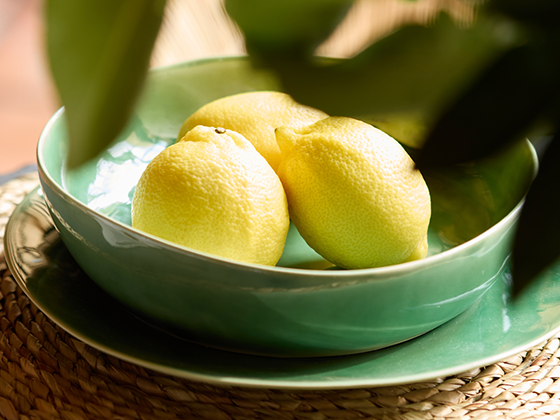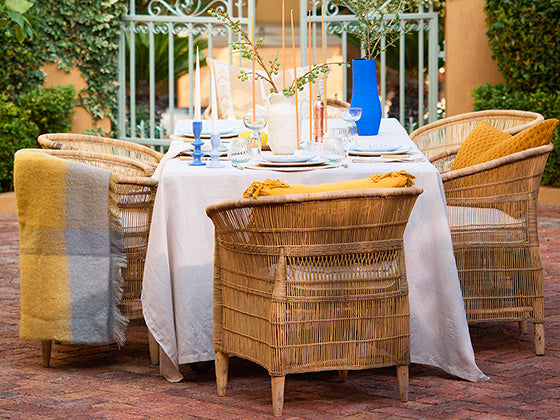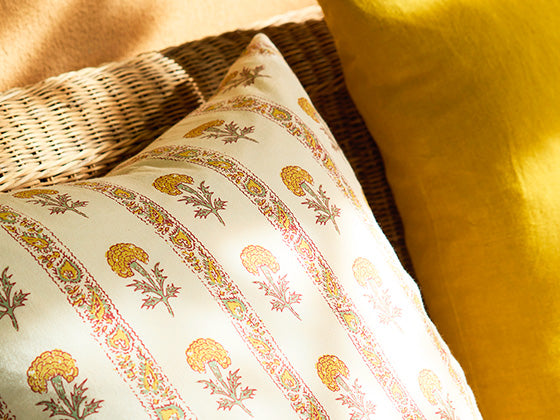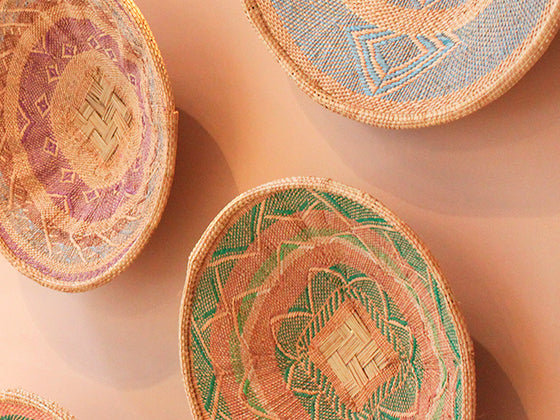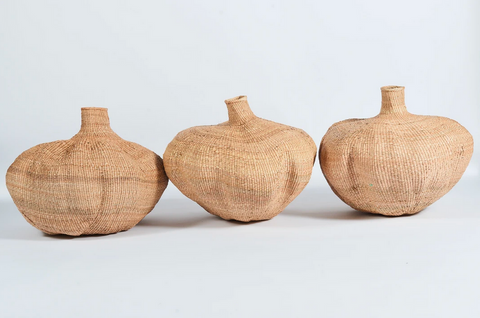
In this month's Artisan Focus series, where we share in more detail the stories and skills of the makers and co-operatives we work with across Africa, we meet Jane Taylor - the founder of the Collaborative Craft Projects. After 31 years living and working in Zimbabwe, running and operating safari lodges and game camps - Jane had built up a local network of artisan contacts and female weaver co-operatives that she collaborated with on her designs to furnish. After a 'lightbulb' moment that the demand for these heritage skills and beautiful hand-crafted pieces could be brought to a larger, global audience through a retail arm of the business and so Collaborative Craft Projects was born...

How did you fall in love with Africa?
My love affair with Zimbabwe began at the young age of 21 when I was ‘dropped’ into the African wilderness and spent 13 years running and operating our safari lodges and game camps with my now husband Piers, of 31 years. It was an unbelievable introduction to life in Africa and some of the happiest years of my life. I feel very privileged to have had the opportunity and I firmly believe this is where it all began.
How do you work ‘collaboratively on craft projects’?
We work closely with over 15 artisan producer groups across Zimbabwe and regionally and its a long and drawn out process! We believe in cooperation and collaboration and work hard to ensure this is a ‘win-win’ situation for the producer groups and ourselves. Hand in hand we design and create products we believe have a place in the global marketplace and constant dialogue and engagement is at the heart of all the work we do. We aim to empower the women we work alongside to make decisions, teach basic business skills along the way, and they are fully engaged in the process from start to finish. In order for this to provide a valuable return on everyone’s investment, the opportunity for conversation and discussion throughout the process is vital. We learn from each other and it’s an extremely rewarding way of working together.
Talk us through your design and making process
From sticks in the sand to sketches on WhatsApp, detailed diagrams and endless sampling, we manage to create and develop our range of product together with these talented, mostly female, artisans. Bearing in mind we are often working at ‘grass roots level' and there is a communication barrier, the ability to keep things simple is key to all the design work we do. Samples for the artisans and us are a requisite of all project and development work we do, which reduces the margin for error and ensures we are all on the same page.

If you could only pick one, what would be your favourite African craft skill?
The skill of weaving is a universal one, and certainly one that has always intrigued me. There are regional and global variations in the methods, materials and techniques, but I never cease to be amazed at the skill and ingenuity of women in producing such fine work with their own two hands, usually with raw materials found close to their rural homes and no mechanisation at all. Historically, it has provided them with practical and useful products in their communities, that have now translated and evolved into highly sought over statement pieces in the modern home.
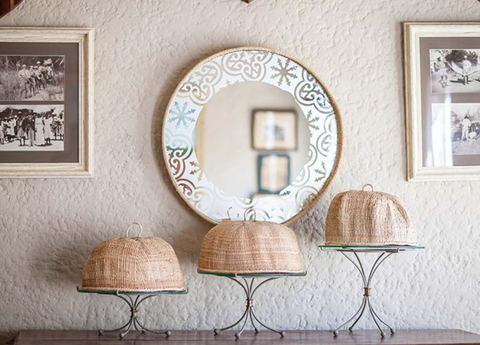
What qualities do you think woven homewares bring to a home?
My homes are full of ‘woven wonders’ from our many years of producing, and I am an avid collector on our travels and safaris. I believe all basketry and woven elements adds instant ‘texture’ and softens any space instantly. Any carefully curated artisanal product in a home always provides great conversation topics - and for me it’s always associated with a memory or a journey I have travelled. I love adding statement pieces to spaces, and have several feature walls and lovely displays of exceptional basketry from my collection. We also have a great selection of functional homeware, which is always great for everyday use. I don’t tend to overthink it too much & I love ‘utility’ just as much as incredible artworks and statement pieces in my family home and life - whether its laundry, general storage ( can’t ever have enough!) or in our busy kitchen.
With little or no access to a viable market place without the help of brand like ours and yours, the producers are unable to take their business to the next level, scale and earn a living. With 99% unemployment, and a largely uneducated population living on the breadline, these women have only their hands and the skills handed down to them by the grandparents. We have taken it upon ourselves to engage these small communities and develop products with these producers, to help them to build small businesses that are sustainable and regenerative. The key is providing the ‘link’ and creating products for a global market without compromising on quality, price and design or harming the environment. Ultimately, is has to be able to run without our help, and whilst this may take many years, it is the aim of all of our projects to be able to allow these groups to flourish and grow independently.
What are your bestsellers?
Binga baskets, Buhera and the famous Garlic Gourds will always be bestsellers for us (see below) as they are unique to Zimbabwe and have really increased in popularity with designers and residential homeowners wanting to recreate a memory from a trip, or just branch out and become slightly more adventurous in their homes with some unique pieces from our Heritage collection. We tend to 'over scale' and supersize things, so have had incredible success with our artworks and collectables some of which span over a metre in width.
What would be your style tips for someone looking to add woven homewares to their home?

Start at floor level and work upwards, layer and add as you can. We use our seagrass squares and rush matting to anchor any space, and recommend layering with Kilims, Persian rugs, and Nguni Cow skins. Statement pendants and lighting is great fun if you have the scale, and advantage of added height in a room and you have such wonderful light bulbs in Europe to create the perfect ambient lighting for any setting or season. I love planters as a great way of bridging the gap, and love bringing the outside in, always having some interesting foliage real or artificial to add a sense of the ‘tropical’ - these can also be so low maintenance especially in the UK.
Our “table top” selection is another easy and affordable way of bringing a woven element into your homes through your entertaining. We love large woven ‘chargers’ and a variety of our different heirloom trays, and baskets for serving cocktails and displaying food at various heights for the perfect party setting. Add a food cover for outside and you have all you need!
Clutter and chaos is part of most busy households and families, so basketry and all our woven homewares are ideal for clutter and “kids kit” and especially for halls and conservatories, boot rooms and laundries. Enjoy experimenting with different functional pieces and finding the best fit for your home and life, and never be afraid to over scale and experiment with adding unique investment pieces and tribal artworks to the top of linen presses or vintage armoires to add immediate height, scale and interest in a room.
Finish the sentence: CCP is my passion because…
I genuinely believe that my life’s mission has been to follow this path, and feel so fortunate to have built a small business I love and enjoy growing with the help of my incredible team. Africa is full of huge hardships and struggles, and to be able to provide meaningful work for these marginalised communities and continue to design new products for the international marketplace has been a dream come true.
To work closely with our artisan partners, and see them flourish as they hone their craft has been an incredible privilege. Seeing their smiles when they receive recognition for their work is always rewarding. I feel extremely fortunate to do this for a living and consider myself an “ambassador to artisans” . I will keep supporting and encouraging the entire sector as we expand collaborative craft projects into other areas of the handmade space, and hope to encourage others to invest in small businesses and the communities they support. To partner with like-minded brands who share this passion and our ethos is key to the work we do, and something we will continue to build on for the future.

Beauty in nature
All our pieces created by Collaborative Craft Projects are woven from natural, indigenous plants and grasses that they harvest locally and sustainably:
Ilala Palm leaves are used in many of the baskets and pendant lights created by Collaborative Craft Projects; naturally cream in colour they can be steeped in a 'tea' of various barks and botanicals to achieve a natural dye process.
Ibhuma reeds, known in the UK as Bulrushes, are sustainably harvested by hand and dried naturally in the open air until they loses their green colour. It is then plaited and woven into our hard-wearing reed mats, bound with natural sisal threads.
Natural cane is sourced in the Bohera district; pliable when soaked in water it is an expert skill to bend and shape the cane to create tables, furniture and mirrors which are then sealed to protect them from moisture in the air and a matte finish.
Signature pieces
Our boho pendant is woven from Ilala palm - a contrast of tightly woven strands and beautiful raw fringe finishes.
Our Buhera baskets are a perenially bestseller - they come in a range of sizes and make a great structural statement in a cluster, or as a standalone vase filled with dried grasses.
A true statement piece of woven art, our Ilala 'garlic gourds' are beautiful in their organic form. Perfect as a standalone basket, or can be mixed with our more colourful designs for a neutral contrast.

